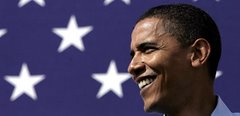Obama in the New Yorker
The latest issue of The New Yorker features a profile of Barack Obama, including insights from friends and colleagues who have known him for years.
Here is an excerpt from the profile, titled "The Conciliator," by Larissa MacFarquhar.
Some people go into politics with an idea; Obama went in with an example. The only politician he discusses at any length in his first book is the black man who was mayor of Chicago when Obama first moved there, in 1985, Harold Washington. Obama doesn't mention what platform Washington ran on, or what he accomplished in office (though he implies that it wasn't much); he talks about the effect his election had on the black community. When he first arrived in the city, Obama noticed that, all over the South Side, people had hung Washington's picture on their walls. "The night Harold won, let me tell you, people just ran the streets," a barber Obama calls Smitty says. "It was like the day Joe Louis knocked out Schmeling. Same feeling. People weren't just proud of Harold. They were proud of themselves." Washington's victory, Obama saw, had produced in people an almost religious feeling of deliverance. "Like my idea of organizing," he concluded, Washington "held out an offer of collective redemption." It is unlikely that Obama would speak of his own candidacy in these terms—that would be embarrassing. But his talk of unity, his avoidance of blame, and his promise to end the war all seem intended to gesture to a similar prospect of redemption: not only for black people but for white people (for voting for a black man), for Republicans (for embracing unity with a Democrat), and for Americans (for saying to the world that the war was a mistake).
The complete profile is well worth the read. Also, check out the accompanying slide show, titled "The Long Road."

